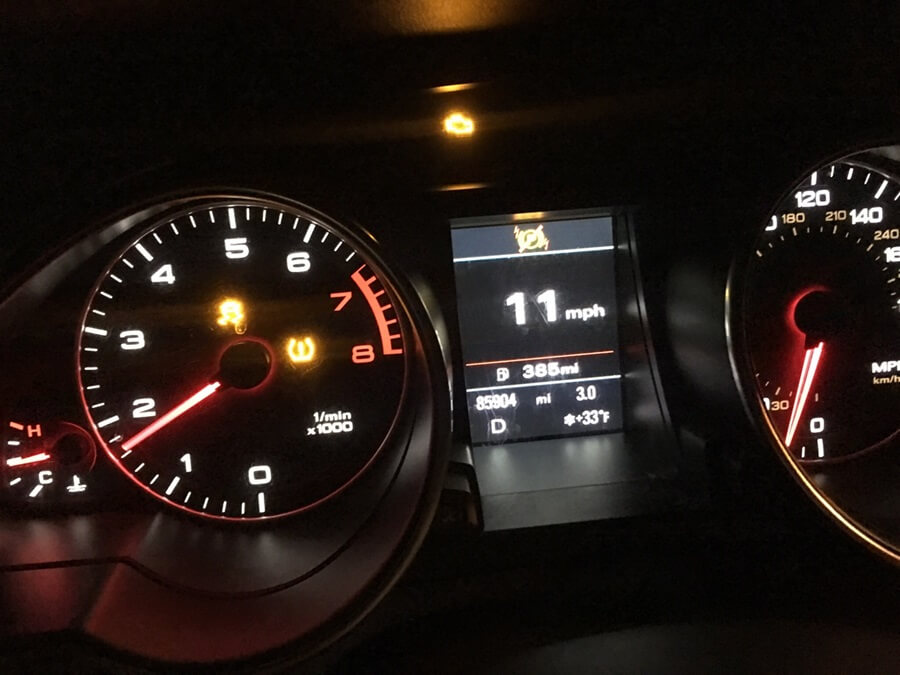It is well known that Audi vehicles offer performance and luxury. Cars manufactured by Audi are known for their reliability, quality construction, and enjoyable to drive. It is well known that Audi automobiles are highly technologically advanced and stylishly designed. Despite this, Audi vehicles can develop issues over time, particularly if they are neglected or used extensively.
As luxury vehicles, they may require expensive repairs; however, if problems are not addressed right away, further maintenance may be needed that is even more costly. Therefore, you should know that parking brake malfunctions are among the most common problems affecting Audi owners. The purpose of this article is to tell you what causes this problem and how to resolve it.
Audi Parking Brake Malfunction Overview

Basically, this is a dashboard warning indicating a problem with the parking brake. A malfunction light will appear on the dashboard when the vehicle’s electronic control unit (ECU) detects a problem.
Parking Brake Malfunction Causes
In the event that your parking brake malfunctions, here are some possible causes:
Parking Sensor Malfunction
A malfunctioning parking sensor prevents the parking brake from applying when the driver presses the parking button. A driver may not be able to release the parking brake when he or she applies the brake. The car might still move when parking brake lights are turned on or get stuck in a parking place regardless of whether parking brake lights are activated.
Damaged Brake Pads

In the event that the parking brake does not work correctly after checking the fluid level and quality, it might be time to replace the parking brake pads.
In the event that parking brake pads become too thin over time, the parking brake may no longer work. In order to keep your car running smoothly, you’ll need to replace your worn-out brakes.
ECU Malfunction
In your analysis, you have found that the parking brake problem was caused by Audi’s electronic control unit (ECU). You can calibrate the ECU easily. Calibration files are available on the Audi website, and then they should be applied while following the on-screen instructions.
Contaminated Brake Fluid
The brake fluid becomes contaminated over time as a result of dirt and other debris. Due to this, the parking brake may fail. It is necessary to replace and clean your Audi’s fluid if it is suspected of being contaminated.
Parking Brake Cable Defect
If your parking brake is still not functioning properly, you may need to replace the parking brake cable. By applying the parking brake, the parking brake cable applies pressure to the brake pads. It is possible that the cable will wear out over time or suffer damage over time.
Batteries Issues

The electronic parking brake in every Audi car relies on electricity to operate. If the battery is weak or failing, the parking brake may not be able to be activated or deactivated.
Battery problems are often caused by a weak or drained battery. In situations where the battery voltage is low or the battery is not fully charged, the parking brake can not be activated or deactivated. Winter months can be particularly challenging, as the low temperatures may result in batteries losing capacity.
Read: Honda’s Emission System Problem
Read: How To Turn Off Tesla Location in Model Y, 3, S, X
Read: Mercedes Service B0
Audi Parking Brake Malfunction Solutions
The following are some solutions you can use to resolve this problem:
Verify That Everything Is Clean
The components of the electric parking brake should be inspected on a regular basis. Considering brake pads apply the force required to slow down a car, they are crucial for stopping it.
Unplug and Plug the Battery Back in
Parking brakes are crucial if they are not working properly. It will also reset the parking brake and all of the vehicle’s electronics.
Verify that the Voltage is Appropriate
Having the right amount of braking power is essential for the car to stop when needed. A battery issue or an issue with the Electronic Control Unit (ECU) may lead to an increase or decrease in voltage. In order to check the voltage, the driver will need to use the necessary diagnostic tools.
Use A Compatible Scanner To Read Codes
OBD-II ports on Audis are usually found behind the steering wheel, near the driver’s side door. You can read any error codes on your PC using a suitable scan tool. It may be possible to figure out and fix the brake-related code.
What Cars Have Electronic Parking Brakes?
Electronic parking brakes (EPBs) are new technology already included in many Audi models. Many Audi models have included EPBs since the early 2000s, and it is currently standard on most of the new models.
EPBs are found in many well-known Audi models, including the A1, the A2, the A3, the A4, the A5, the A6, and the A8. There are some cars with an electronic parking brake that can be controlled by a small switch on the dash or center console. Through the use of electric motors, the EPB system applies and releases the brake instead of relying on conventional mechanical systems.
How To Reset The Audi Electronic Parking Brake?
The following steps will guide you through the process of resetting your Audi’s parking brake:
Read: Honda A127 Service Code
Read: B123 Honda Service
Read: Honda A123 Service Code
Conclusion
In the Audi, the electronic parking brake streamlines and simplifies the vehicle’s design. Although electronic parking brakes are an important innovation, drivers still have to deal with several issues.
You can still operate a vehicle despite the parking brake malfunction notice. You won’t notice any difference in your car’s performance.
